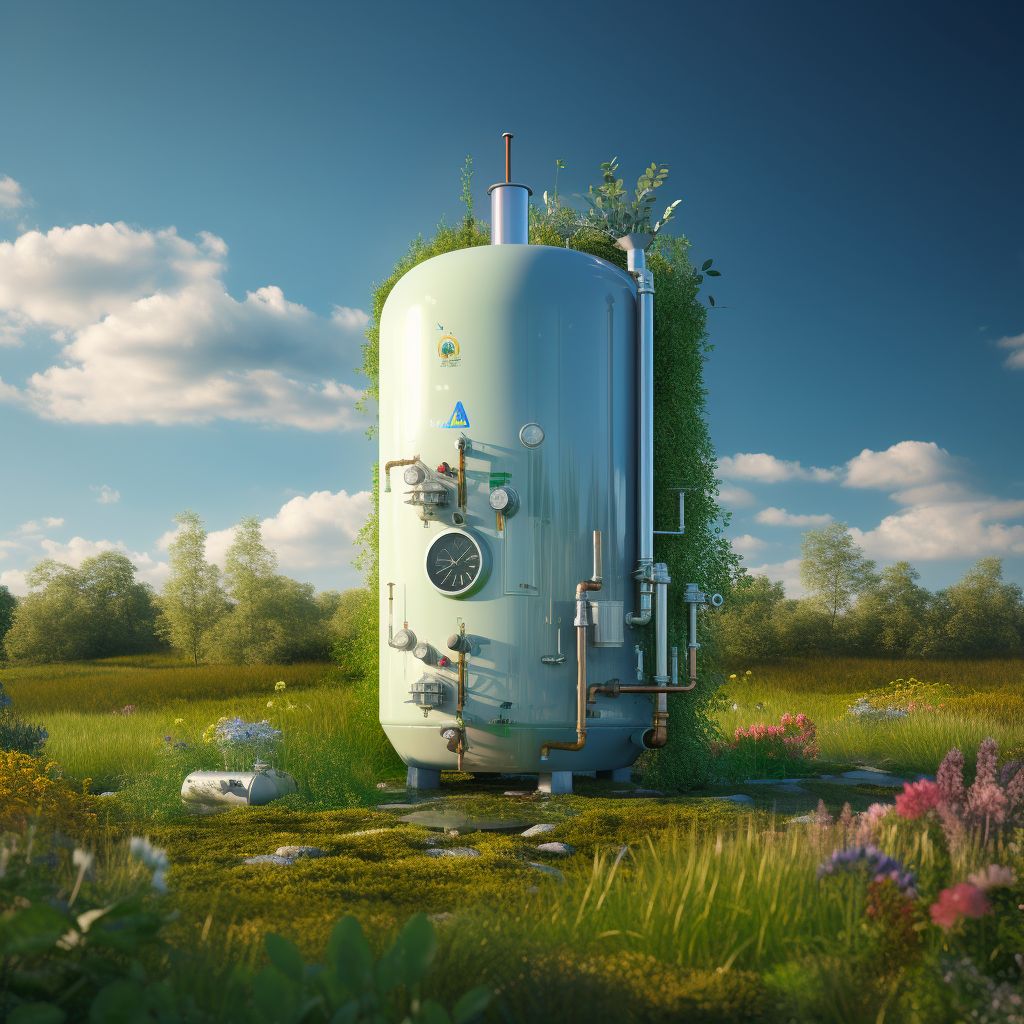Water heaters and Environmental Sustainability.

Water heaters and Environmental Sustainability.
Water heaters and Environmental Sustainability. You’re likely unaware of the environmental impact your water heater has. Traditional models can be real energy hogs but don’t worry, you’ve got options.
This guide introduces you to the world of energy-efficient heaters, offers tips to reduce energy use, and even explores sustainable alternatives.
Ready to make your water heating more eco-friendly? Let’s dive in!

Tips Water Heaters and Environmental Sustainability. Key Takeaways
- Regular maintenance is essential for optimal efficiency and to avoid wear and tear.
- Switching to energy-efficient models can significantly reduce energy consumption and save money.
- Sustainable alternatives such as solar water heaters and heat pump systems reduce carbon footprint and energy bills.
- Conscious choices towards energy efficiency and sustainability contribute to a healthier planet.
Understanding Water Heater Efficiency
When choosing a water heater, you must understand that its efficiency can significantly impact both your energy usage and the environment. It’s crucial to consider the Efficiency Ratings. Higher ratings denote more efficient units, using less energy and reducing your carbon footprint. But, efficiency isn’t just about ratings.
The Maintenance Significance plays a pivotal role too. You can’t neglect your water heater’s upkeep if you’re aiming for optimal efficiency. Regular maintenance ensures it runs smoothly, conserving energy and saving you money. Look out for signs of wear and tear, and don’t hesitate to call a professional if you’re unsure.
Impact of Traditional Water Heaters
Continuing from maintaining your heater’s efficiency, you mightn’t realize the significant impact traditional water heaters have on the environment. It’s not just about energy consumption, but also the heater lifespan and installation impact.
A traditional water heater’s life expectancy is typically around 10-15 years. When it reaches the end of its lifespan, disposal becomes an environmental challenge. Old heaters often end up in landfills, contributing to pollution.
Installation impact is another factor. The process often involves considerable energy use and waste generation. Plus, if you’re replacing an old heater, that’s more waste.
Switching to a more sustainable option can reduce these environmental impacts. You’ll not only save money on your energy bills, but you’re also doing your part for the planet. It’s a win-win.
Benefits of Energy-Efficient Models
You’re probably wondering, ‘What are the benefits of energy-efficient models?’
They’re not just about saving the planet. They can significantly lower your energy consumption, save you money, and reduce your carbon footprint.
Lower Energy Consumption
By opting for energy-efficient water heater models, you’ll significantly reduce your home’s energy consumption, leading to notable environmental and financial benefits. Features like green insulation and smart thermostats are key in these models.
Green insulation helps reduce heat loss, thus lowering the energy needed to heat your water. This not only cuts down your carbon footprint but also your bills.
Smart thermostats, on the other hand, allow you to control and schedule your water heater’s operation to match your usage patterns. This means your heater isn’t working unnecessarily when you’re not home, saving more energy.
Cost Savings
Switching to energy-efficient water heaters can significantly cut down on your monthly utility bills. These devices use less energy to heat water, leaving more in your pocket. They’re considered sustainable investments for your home and can pay off in the long run.
Moreover, you can take advantage of incentive programs offered by manufacturers and government agencies. These programs can offset the initial cost of an energy-efficient water heater, making it more affordable. Look for Energy Star-rated models that qualify for rebates, tax credits, or other incentives.
In the end, investing in an energy-efficient water heater can save you money and contribute to a more sustainable environment. It’s a win-win situation for your wallet and the planet.
Reduced Carbon Footprint
Aside from saving you money, using an energy-efficient water heater greatly reduces your carbon footprint, making it an excellent choice for those concerned about environmental sustainability. Green innovations in these appliances lead to less energy consumption and, therefore, fewer greenhouse gas emissions. You’re not just cutting costs; you’re also helping combat climate change.
These models also require sustainable maintenance. Regular servicing ensures optimal performance and longevity, which avoids the waste of early replacement. With your conscious choice, you’re contributing to a healthier planet. You’re doing your part in promoting sustainability, and that’s something to feel good about.
Choosing energy efficiency is a win-win situation: you’re saving money and making a positive impact on our environment.
Reducing Water Heater Energy Usage
To curb your water heater’s energy consumption, you’ll need to adopt some efficient practices.
Insulation methods are a simple start. By wrapping your heater in an insulating blanket, you’ll minimize heat loss, thus saving energy.
Proper maintenance routines are equally crucial. Regularly drain the tank to remove sediment buildup, which can hinder its efficiency. Also, consider lowering the thermostat; every 10 degrees reduction can save up to 5% on energy costs.
Take shorter showers, install low-flow fixtures, or even upgrade to a more energy-efficient heater.
Lastly, consider switching to a solar water heater to further decrease energy usage.
Sustainable Alternatives to Conventional Heaters
Let’s shift our focus to sustainable alternatives to conventional heaters.
Have you considered solar water heaters or heat pump systems?
These eco-friendly options can significantly reduce your carbon footprint while still providing you with the comfort of hot water.
Solar Water Heaters
Switching to solar water heaters can be a significant step you’re taking towards environmental sustainability, reducing your carbon footprint and energy bills all at once.
But like all technology, it’s not without its challenges. Installation can be tricky, requiring optimal positioning for sunlight and serious plumbing modifications. Additionally, solar maintenance is critical to keep the system running at its best. This may involve regular cleaning, system checks, and component replacements.
Despite these hurdles, don’t let the initial complexities deter you. With professional help, installation and maintenance become manageable tasks.
Plus, the long-term environmental benefits coupled with the potential savings on your energy bills make solar water heaters a sustainable and economical alternative to conventional heaters.
Heat Pump Systems
Why haven’t you considered heat pump systems yet, a remarkable and sustainable alternative to conventional heaters? These systems are incredibly energy-efficient, using a small amount of electricity to move heat from one place to another rather than generating it. Sure, there may be some installation challenges, but with a professional on hand, it’s a manageable task. Moreover, the cost can be offset by the significant savings on your energy bills in the long run.
Pump maintenance is also straightforward. Regular check-ups and timely repairs can ensure your heat pump system runs smoothly for years to come. Remember, it’s not just about saving money; it’s about making choices that help protect the environment.
Tips for Eco-Friendly Water Heating
For Water heaters and Environmental Sustainability ,You can cut down on your environmental impact significantly by adopting these tips for eco-friendly water heating.
Consider using green insulation for your water heater. It’s made from recycled materials and helps reduce heat loss, saving energy and cutting down your carbon footprint. Green insulation isn’t only eco-friendly but also cost-effective due to reduced energy bills.
Switching to tankless systems can also be a game-changer. They heat water only when you need it, avoiding the energy waste of maintaining a hot water tank. Tankless systems are more efficient and can greatly reduce your energy consumption.
Frequently Asked Questions
What Are the Costs Associated With Installing a Green Water Heater?
You’ll encounter costs for the green heater brands, installation, and potential home modifications. However, you’re investing in a product with a positive sustainability impact, reducing energy use and long-term operating costs.
How Often Should an Energy-Efficient Water Heater Be Serviced?
You should service your energy-efficient water heater annually. Regular servicing maintains its energy savings potential, ensuring it runs at peak efficiency. Remember, it’s an investment in the long-term performance of your appliance.
Can I Install an Energy-Efficient Water Heater Myself or Do I Need a Professional?
You can install an energy-efficient water heater yourself but consider the DIY risks. Doing it wrong could cause damage. Plus, it might affect the warranty’s validity, as some require professional installation.
What Are the Potential Tax Benefits or Rebates Available for Switching to an Energy-Efficient Water Heater?
You’re potentially eligible for tax credits and rebate programs when you switch to an energy-efficient water heater. Check out local and federal Tax Credit Eligibility and Rebate Programs Overview for specific benefits.
How Long Does It Typically Take for the Savings From an Energy-Efficient Water Heater to Offset the Initial Investment?
Considering the efficiency comparison and brand selection, it typically takes 2-6 years for energy-efficient water heater savings to offset your initial investment. You’ll see bigger savings if your water usage is high.
Conclusion
In conclusion, Water heaters and Environmental Sustainability go together. You have the power to make a significant impact on environmental sustainability through your choice of water heater. Opting for energy-efficient models or sustainable alternatives can significantly cut down on energy usage, reducing your carbon footprint.
Remember, every little bit helps, so even small changes like reducing your hot water usage can contribute to a greener future.
Make the switch now and do your part to save the environment.
Learn more about plumbing here:https://jmkplumbing.com/why-choose-tankless-water-heater/